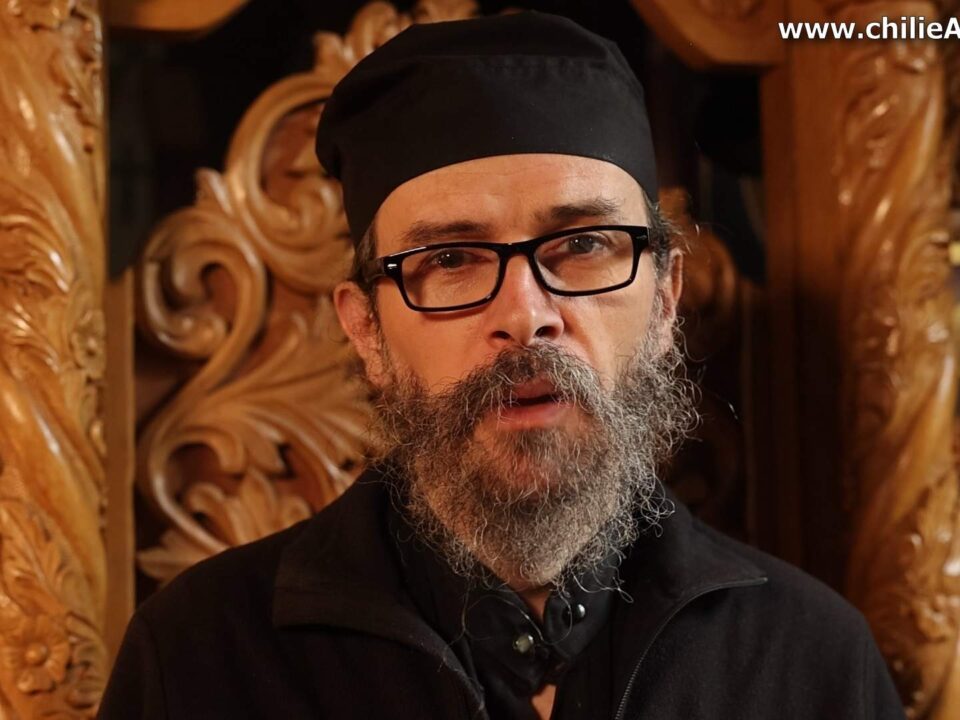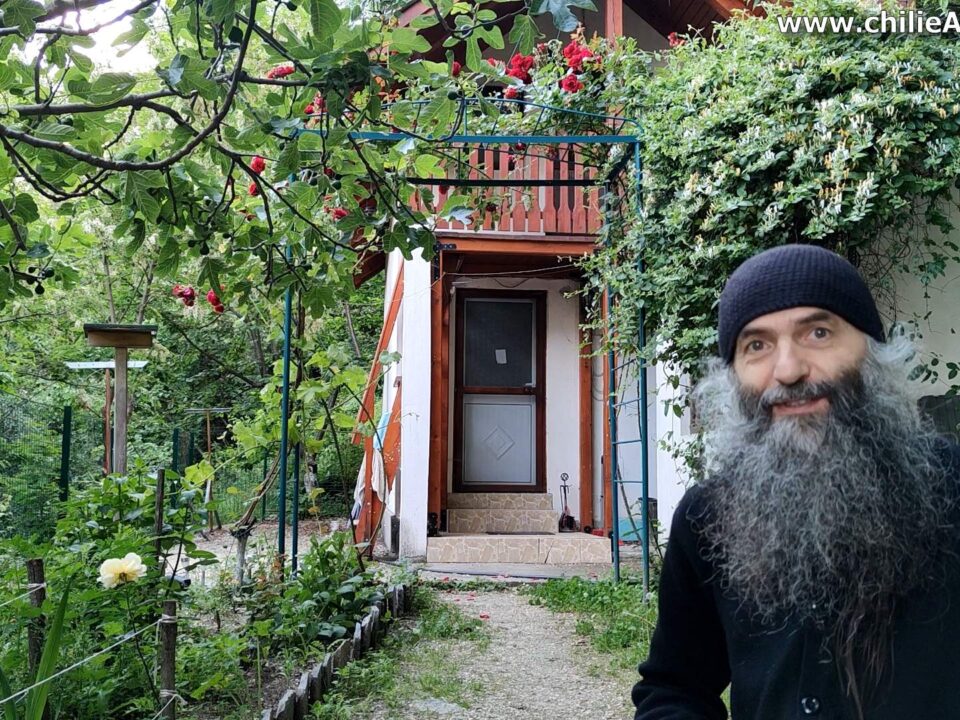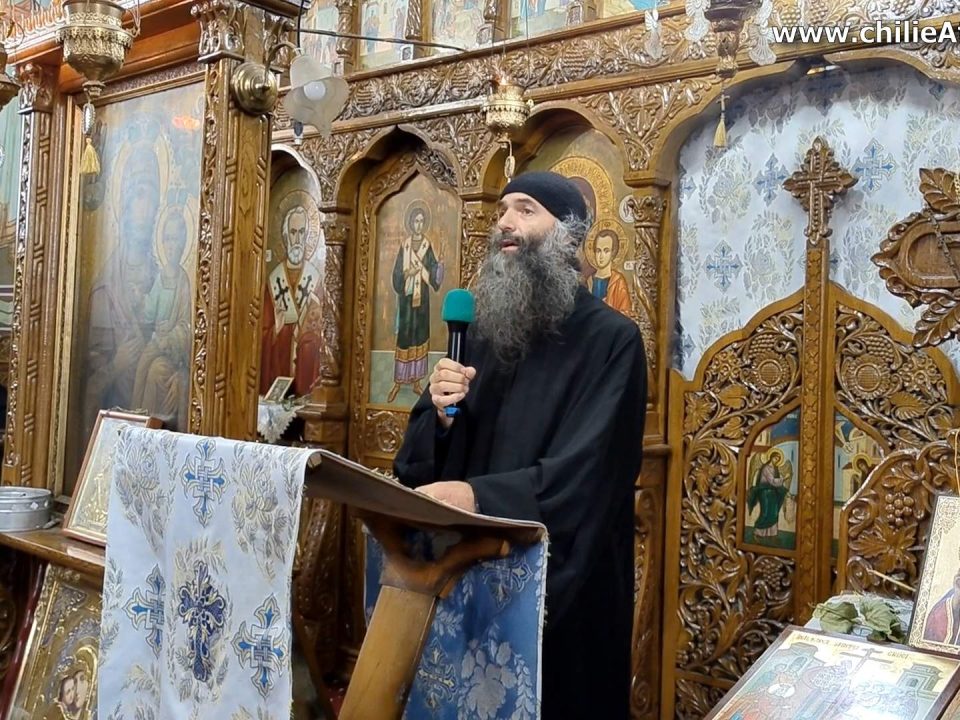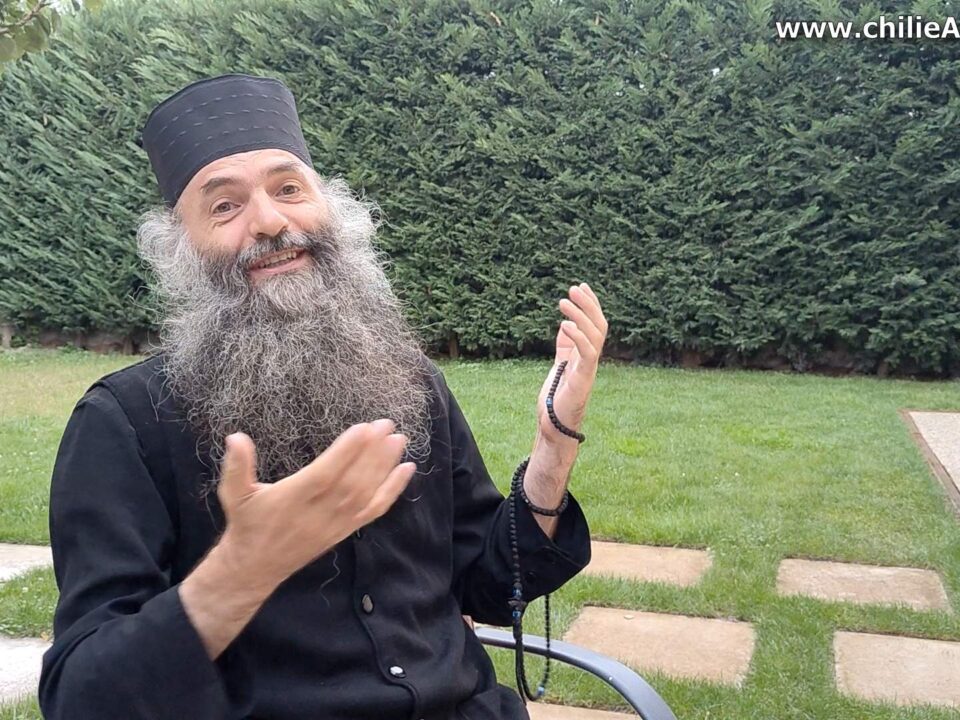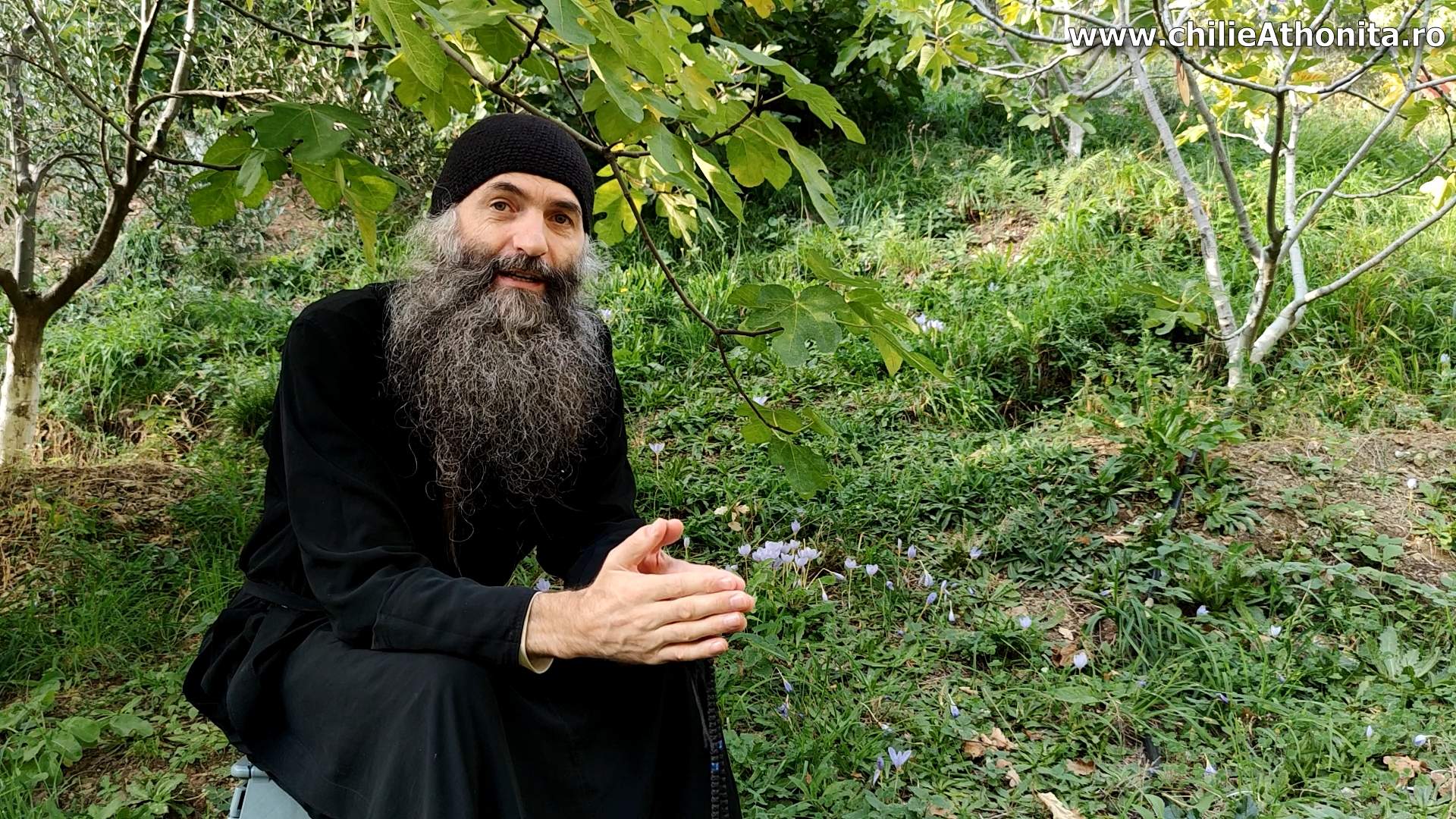
Aviation Miracles – Father Pimen Vlad
3 November 2022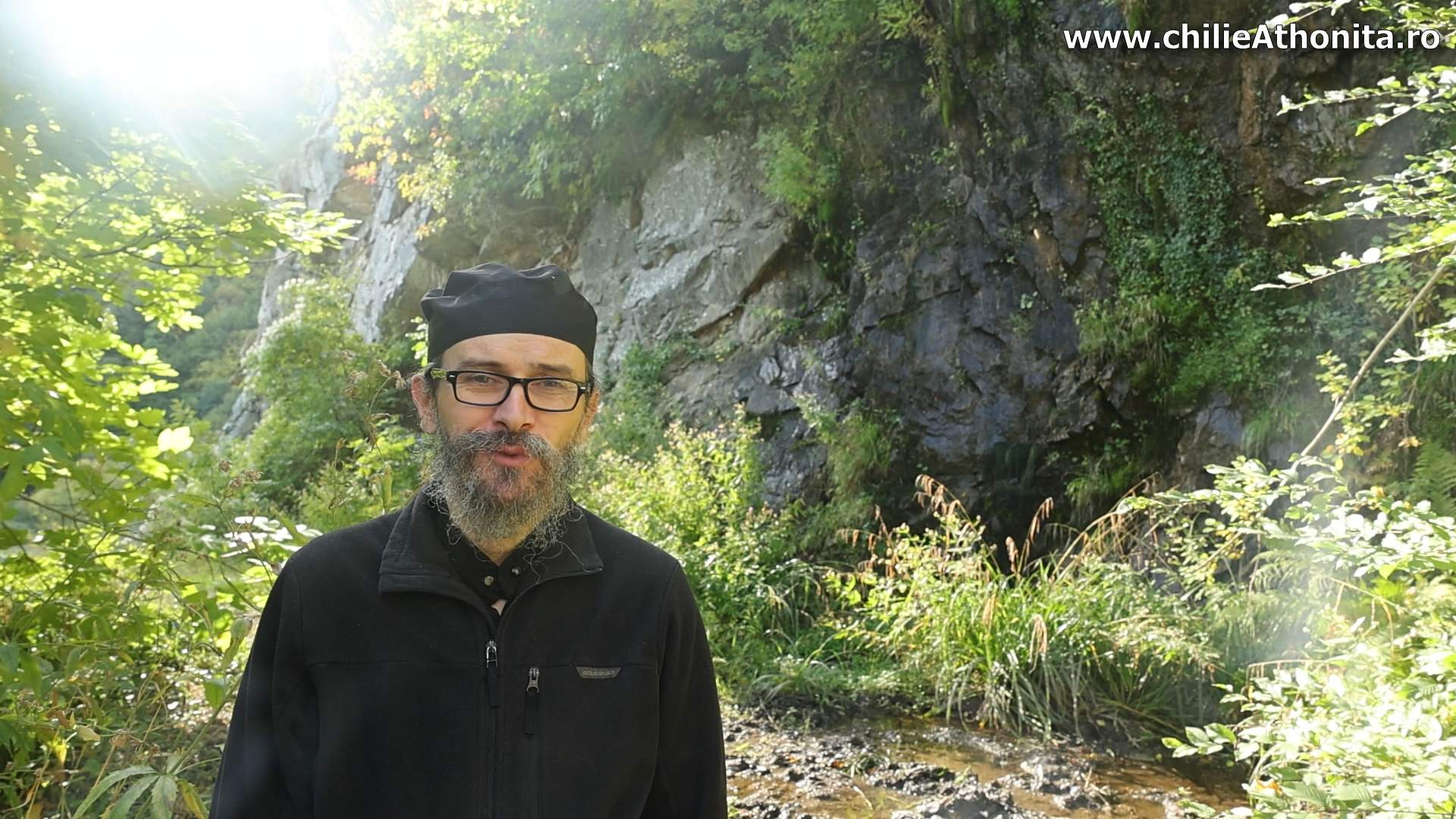
Anger in the 21st Century – Father Theologos
8 November 2022Watch a very necessary discussion (unfortunately!) with Father Athanasie Ulea who, besides being a very pious priest, also has knowledge of psychiatry and works in this field at a clinic in Germany.
Watch a much-needed approach to depression today in the context of mental illness from an orthodox point of view.
Enjoy!
Glory to the Father, and to the Son, and to the Holy Spirit, now and forever and unto the ages of ages. Amen. Lord have mercy, Lord have mercy, Lord have mercy. Father, your blessing!
The Lord is always with us with His grace and love for mankind, now and forever and to the ages of ages. Amen.
Fr. Theologos: We are here with Fr. Athanasie Ulea who is a priest in Germany and what is very special about Fr. Athanasie is that he has knowledge of…
Fr. Athanasie: Psychiatry and dynamic psychotherapy.
Fr. Theologos: Yes, because today, although I do not like this word, the relationship between Orthodoxy and psychotherapy is very fashionable, but especially because of the current of thought… it started with Father John Romanides, I think you know what I mean, His Eminence Hierotheos Vlahos – “Orthodox Psychotherapy”… We would like you to tell us a few words on this subject, how do you see the relationship between Orthodoxy and…?
Fr. Athanasie: Yes, because you mentioned the two big names, I think there is a little confusion from the translation of the book “Orthodox Psychotherapy.” His Eminence Hierotheos Vlachos, I met with him once and the translation would have been more correct, I think, from my point of view, as “Orthodox Spiritual Therapy.” Because he refers to spiritual therapy of the soul. Psychotherapy at least in Romanian, but also in other languages I think, is a technical term that actually refers to talk therapy and which is a real science, there are studies on this topic, there are of course more… It is very diverse, but it is quite different from Orthodox spiritual therapy.
Fr. Theologos: What would be the difference?
Fr. Athanasie: If I were to explain a little, we often understand man as body and soul and there are doctors for the body and as medicine has evolved a lot, these doctors are very specialized. Yes, there are doctors, I often say, rhythmologists – they only deal with heart rhythm disturbances, so something very targeted. And now of course the soul has several categories, let’s say not like organs, but several layers…
Fr. Theologos: Parts…
Fr. Athanasie: And I would say there’s a psychological part of the soul which pertains to the body. Yes, which can be determined at the biochemical level in our body, can also be influenced from the outside by electromagnetic waves or substances, by drugs, and this psyche belongs to the body. It, I would say, according to St. Maximus the Confessor, has no freedom because it depends on impulses in our body, and the spiritual part is free of these chemicals substances, of these electromagnetic waves, and rather it belongs to our direct connection with God and it would be free.
I also start with this division from St. Maximus the Confessor in Mystagogy in which he shows these powers of the body and talks about the duality that exists both in us as body and soul, but also in our soul as a rational part and what he calls intellectual part, I think.
Fr. Theologos: Yes, yes. So in order to understand, someone can be, so to speak, not of sound mind, but he can be a very spiritual person, right?
Fr. Athanasie: Exactly, I believe that Father Aimilianos of Simonopetra gives an example of two saints even who had schizophrenia, because of course any disease, when we suffer, any disease manifests itself both bodily and psychologically, but also spiritually. The deepest, of course, are spiritual diseases, but to treat spiritual illnesses you have to have a certain bodily stability, a certain psychological stability, and then you can actually work on the details somehow. When I have appendicitis, of course, I can still have my pride, maybe I still have my personality problems, but that’s acute and that needs to be solved by a surgeon, I don’t go to the confessor to treat me for appendicitis or because pride should be treated then.
So everything in its own time and likewise for the psychological side, if I have severe depression, many confuse it with severe laziness, but a severe depression, it can be quantified, so to speak, at the bodily level, and then first drugs must be given, then psychotherapy must be done and of course maybe in parallel or towards the end you can also work on the spiritual part, which is much finer, which needs a much stronger personal relationship with that person. And this cannot be carried out in an acute mental illness.
Fr. Theologos: Aha, so I understand that there are bodily diseases, mental illnesses and spiritual illnesses.
Fr. Athanasie: Exactly.
Fr. Theologos: So, you mentioned depression – what are the causes of depression and how is it treated, how is it cured?
Fr. Athanasie: Yes, depression is a polymorphic disease and, to put it this way, somehow mental illnesses also depend on the culture of a person, on what the person knows because they are somehow influenced by the person as well. They represent an escape from a crazy environment. And then you react with a certain disease and in this case it would be depression. Depression is very polymorphic and can have many symptoms and has many causes.
There are genetic causes. If you have a depressed parent you’re more likely to get depressed, the risk I think is three or four times higher. If I have a depressed brother, it’s the same. In twins, likewise, the probability is much higher, close to 50%. So this is because, on the one hand, the disease is transmitted in a genetic way, there are receptors or neurotransmitters that do not work well, that do not do their duty properly, are missing or are present to a very small extent.
At the same time, there are, of course, family influences when a person learns a depressive way of thinking, I would say, in childhood and develops it in time, and in crisis situations there is actually talk of a combination of these genetic, family defects that in certain crisis situations actually determine the disease. And that’s why the disease is treated on the one hand by medication, yes, in severe situations it cannot be otherwise and this does not help in 100% of cases, but it helps the person to somehow get on his feet, so that you are able to talk to him, because a depressive illness and in general a mental illness is an inability to modulate your thinking.
When I talk to someone based on my knowledge and what input I get from the other person, I can change my thinking. With a depressed person you can talk to for days, he does not change his thinking, his feelings.
Fr. Theologos: He is not obedient, actually.
Fr. Athanasie: Yes, we would say that at a level of freedom, but there is no freedom there, really. There are closed circuits, let’s say, in which it is very difficult to penetrate, and drugs often help to put … Of course, in addition to regulating the number of neurotransmitters in the brain, they induce neurons into an infantile state in which they can modulate themselves.
Outside the nerve cell, there is a wall that protects them, a protein wall, I don’t to know exactly, but this wall on the one hand protects them, on the other hand also prevents them from changing very easily. And then, antidepressants alter this wall so that nerve cells can change, can make new connections…
Fr. Theologos: That is, it makes a person more obedient, so to speak.
Fr. Athanasie: To be able to shape their thinking. Exactly.
Fr. Theologos: In fact, we see that ultimately all things are spiritual. I mean, it’s sin. They have a sinful, distorted environment at home that influences man. He can have a certain sensitivity, from what I understand genetically, or so on, and if he doesn’t have the spiritual experience to know how to manage this, then he falls into this disease.
Fr. Athanasie: Yes.
Fr. Theologos: And then, healing is first of all spiritual, but if a person can no longer obey for various reasons, including genetic, mechanical reasons, that is, he was hit on the head, then drugs help up to a certain point, but the problem will be truly solved only and only from a spiritual point of view.
Fr. Athanasie: Yes.
Fr. Theologos: Because that’s where I think we have the two big extremes; of those who say that [healing] only [happens] with drugs and those who speak of [healing] without drugs. I think things are much more complex…
Fr. Athanasie: As always…
Fr. Theologos: The truth is somewhere in between, so to speak, or rather spirituality is above psychotherapy in the strictly medical sense. And so I reckon, today there is a much bigger need for confessors than psychotherapists, psychologists, whatever, don’t you think?
Fr. Athanasie: I would say there is more need for saints.
Fr. Theologos: Yes, yes… That’s what I’m thinking, yes.
Fr. Athanasie: Because a confessor can cause harm if he thinks he is where he is not, and then I really believe that it is good for a person to know his limits. And then psychotherapists should recognize that certain problems are not in their field. Especially in the case of very faithful people, one must actually work only in the psychotherapeutic sphere, to be able to build a relationship with the confessor because this is actually the problem: the whole illness, in fact both spiritual and mental, is a disease of relating and then I cannot have a good relationship with a confessor or a normal relationship as long as I have a severe mental illness and then it really needs to be stabilized so that afterwards I can interact better with the confessor.
Fr. Theologos: So this stabilization, to be able to move on and relate.
Fr. Athanasie: Exactly, although even then certain impasses will arise, certain problems will arise precisely because that person has a relating defect, has an inability to relate correctly with the other person and then induces problems in the relationship with the confessor. And then he puts the confessor, who is not strengthened in spiritual warfare, in situations that he cannot manage or often mismanages, and then if he does not know his limits either, he can indeed make mistakes…
Fr. Theologos: To do harm. Do you think that women are more prone on this side? Because I think there is something there. Or what are the risk factors?
Fr. Athanasie: Yes, I don’t necessarily know if they’re more prone. Our boss in the clinic said that hysteria is usually more common in women, but worse in men. Now we are one as humans, body and soul, male and female in a smaller or larger portion and somehow because woman in a psychological way… From the beginning, the little girl when she is born, her complement is not the mother who is physically closer to her, but the father with whom she must create a bond. In men, the boy feels good at his mother’s breast and is also his complement as a relationship. Of course, there too, of course, the father has to activate at some point and stabilize the relationship, but we do not go into details now.
But truly, or maybe because the woman for her constitution, it’s not necessarily more frequently, but the woman is more focused on the relationship and then you see, or the relationship has a much more important role and that’s why she sometimes seeks help faster.
Fr. Theologos: She needs support.
Fr. Athanasie: Yes. And mental illness is a cry for help, actually, to resolve it.
Fr. Theologos: Yes, a lack of love. It comes from acute lack of love. Yes… Glory to the Lord! Very interesting. I see that… Okay, now there’s all this fuss with the virus, with the pandemic and so on. Leaving that aside, I see that the diseases of the century today, are mental illnesses; what is the cause? For depression?
Fr. Athanasie: Well, when you’re poor, when you have trouble living from one day to the next, then you think more acutely about these things. It has been said that during the pandemic the cases of depression decreased, those of anxiety disorders increased, but often the depressive ones decreased because they said: look, today there are real problems, these really are problems that we have to deal with!
I think that when a person is somehow doing well, he looks for another way to solve his problems. As long as I am poor, as long as there are problems, then I see that there are things I cannot manage, I see that there are things that are out of my control, and then I seek God’s help more easily. When we have everything in a bodily way, somehow the soul – God created us with some psychological mechanisms of self-control so to speak, of self-regeneration, of healing, and then He urges us precisely through this mental illness… Many times depressed people say “I have everything I need, but I can’t enjoy anything!” and through this realize that there is something more, there is something, it must be sought more deeply…
Fr. Theologos: Oh, so faith cures depression, that’s what you say, it’s a healing factor.
Fr. Athanasie: It should, it should be.
Fr. Theologos: It’s just that people today don’t believe anymore, that’s another story, and I think that’s why there are so many depressed people in the West because they kicked away faith, the true God, the right faith. Very, very interesting and I think… Do you want to say something?
Fr. Athanasie: Just a little to add that even if, let’s say Christians, being Christians in the West, we have a certain standard of living and, thank God, the majority, so to speak, in Orthodox countries no longer suffer as acutely as it is in Africa, perhaps, or in other regions. We train these shortcomings precisely through fasting, through prayer, through …
Fr. Theologos: Ascesis…
Fr. Athanasie: We induce a state of lack precisely in order to seek God there more, to fill this emptiness with the spiritual part.
Fr. Theologos: Do you think that one of the main causes of mental disease is believing in your own thought? Does anyone believe their thoughts?
Fr. Athanasie: Yes, that’s a very hard question. I’m thinking now that we have no thoughts of our own, it seems to us that they are our own and either they come from the devil or they come from God and I think that the man who does not have the consciousness that there is a spiritual war, that there is a war of thoughts…
Fr. Theologos: That’s what I mean.
Fr. Athanasie: Then of course he doesn’t make a difference. Unfortunately, there are also people in the church who are very little trained in this and do not realize that any thought that leads us away from God, from the church, from the confessor, from prayer in the first place is from the devil. And then they stay in their thoughts and don’t cut them off from the root and they aren’t aware that these thoughts… because what is the devil? He’s a clown after all, it’s like that saying: a fool throws a stone into the lake and a thousand wise men can’t get it out. How can you differentiate stones from each other? Likewise with these thoughts, if you stay in a thought, in a crazy system so to speak, you can’t get out of it, it’s like the Gordian knot, it has to be cut and we can only cut it with prayer.
Fr. Theologos: Yes. And if man has no spiritual measure, no prayer, then God forbid!
Fr. Athanasie: Yes.
Fr. Theologos: How is it cured? Through prayer…
Fr. Athanasie: Yes, in all the phases. Depression as I said is a polymorphic disease, it falls into three degrees – mild, medium or severe. The severe one always comes with a somatic syndrome, that is, the person literally no longer has strength, no energy, does not sleep well, does not eat well, even bodily functions are turned upside down. It can be with or without psychotic symptoms, that is, the person has the thought that he will become poor or that there is an acute illness in him.
I had a patient who thought her brain was kind of porridge and she was convinced of that, and you can’t get her out of this situation by conversation. In the case of severe depression, let’s start the other way around, especially if there are psychotic symptoms, medication is necessary, antidepressants sometimes, and antipsychotics to get a person out of this state.
Many unfortunately take a drug for a few days, feel worse maybe and then they stop taking it altogether and say that it does not work. The problem with antidepressants is that they are not drugs, they do not work immediately, they are more like vitamins that help nerve cells, as I said, to reorganize themselves to function well and then they take a very long time to act.
You start with the minimum dose. If in two, three weeks they do not help, the dose is doubled up to the maximum dose. So you can say that a drug did not help only after two, three months. It takes a very long time and often the person does not have patience.
Fr. Theologos: Can it happen that the person sees that they have a good effect and says, “That’s it, I am cured!” and he stops the medication?
Fr. Athanasie: Many times, yes, and of course the disease comes back, that’s more problematic.
Fr. Theologos: Please forgive me! Continue.
Fr. Athanasie: Yes, and what I wanted to say is that, unfortunately, at first, the drugs more readily can have side effects. It is the vagus nerve in our body that is often a little whipped by these drugs, because many times these drugs give a lot of energy and give it at once, but the problem is that all organs have energy, but the person still has no energy, he does not feel it yet… It’s that time lapse… that delay until they work. And then, at first, the person feels full of energy, he may also have symptoms, have muscle or stomach cramps, have diarrhea or other symptoms like these, vertigo or headaches that do pass with time. But in some they really can be very unpleasant and then they give up on them.
The others who endure, Rob Dreier, if you know him, he is known in Romania, has published several books and he has one on how he went through depression and explains exactly that. And then, if a person manages to overcome this phase, he also gets to feel the positive effects of the drug, without having, in the best cases, side effects.
Some, 20 to 30 percent, are not cured, or are not cured with drugs alone, and they need maybe more like I said, maybe an antipsychotic or sleep medication or something else. Or some remain with chronic depression, or even after the person feels well, unfortunately, because some of the antidepressants work so well, the person feels very good and afterwards either does not take them anymore or forgets that he also has to do psychotherapy, forgets that he also has to see the bugs in his system – how he trips himself up.
Fr. Theologos: So they have to move from the psychological plane to the spiritual plane… [Or] We are not talking about a spiritual plane yet…
Fr. Athanasie: Not yet, still on the relating plane, they have to see how maybe messages from childhood – “You have never been good, nothing will come of you, you are stupid or a good for nothing…” – unfortunately parents very easily say these things although they say them to strengthen the child, but it is dogma for the child.
Fr. Theologos: It’s destructive.
Fr. Athanasie: Because parents are like God to the child, and unfortunately, children fail to lower these idols, to actually shatter them, and to put the true God in place. And then in psychotherapy… What’s the problem with psychotherapy? Because the confessor does not have so much time, so many resources for this relationship… You have to think for example, in the therapy I do, there are 40-60 hours, one hour a week for one, two years.
Fr. Theologos: Glory to God!
Fr. Athanasie: Yes, that is, there is a lot of time invested in the relationship that is built, and then a confessor cannot do this for every person and then after the person stabilizes, after or in parallel with this psychotherapy, spiritual action can also be taken – for the person to strengthen prayer, strengthen fasting and the relationship with God, with the true Father and with the true Mother, the Mother of God.
Mother Sophronia says it beautifully; The idea is to get the parents down from the pedestal we put them on, where it’s normal as a child to put parents, in order to listen to them and to have them be everything to us. The idea is to get them down from there and treat them like any other person.
Fr. Theologos: With the due respect, but like any person.
Fr. Athanasie: Exactly. Just as, on the one hand, the Savior tells us to respect our mother and father, on the other hand He tells us whoever does not hate mother and father is not worthy of Me. This hatred refers precisely to the negative things that parents, more or less consciously gave us or still pass on, and to see them as weaknesses. If someone on the street starts swearing at me, I move on, I know they have their problems…
Fr. Theologos: Yes, his mistake…
Fr. Athanasie: The same goes for a parent, now that I am an adult, the parent has to treat me as an adult, on the one hand, and I treat them as any adult, with love, with respect and understand that any weakness of theirs is a weakness that I treat as such.
Fr. Theologos: And I think that’s true love because otherwise it’s a form of idolatry and it’s very difficult.
Fr. Athanasie: And [of] infantilism.
Fr. Theologos: Yes, and I think this also happens in monasticism, especially in the relationships between spiritual child (monk) and abbot.
Fr. Athanasie: Which are pathological because the abbot does not want to make the monk obey out of fear or like a robot, but wants to raise him through this obedience, to simply recognize this spiritual authority and realize that the abbot… And it is natural that the greatest attribute of the abbot is love.
Actually even the freedom that he offers, if you want to reach perfection, then you must follow me, yes, you must follow me. As the Savior told them too: whoever wants eternal life must follow Me. After that, we must of course, obey simply but not as a tyranny, but out of love and for love.
Fr. Theologos: Exactly, as an expression of love.
Fr. Athanasie: Precisely and unfortunately when even the abbot is not raised properly and he understands obedience rather as tyranny, and he has not reached the right place either, then problems can arise there, of course.
Fr. Theologos: Problems… Yes, it’s a whole story… Glory be to God! It was extraordinary and I also want to ask what is the mentality of the Orthodox, not to say of the Romanian Orthodox, but of the Western Orthodox in general – do you see Orthodoxy outside the borders of the country different from the Orthodoxy in Romania, the traditional one so to speak?
Fr. Athanasie: I think the mentality is personal and then I think there are several categories… Now, of course…
Fr. Theologos: Forgive me! Orthodoxy is one. But I see it lived one way in Greece, in another way in Romania, and English-speaking Orthodoxy is lived there differently. How is it lived in Europe, how do you see it?
Fr. Athanasie: Yes, that’s the difference between Romanians or Germans, and converts, because there is another problem. Now I am in a community that I think is 99% Romanian, which before I don’t think there was much difference from the customs in Romania. But I think that in general Orthodoxy in the West is lived in more fully, it is attempted… and our Metropolitan Seraphim and generally in the West…
Fr. Theologos: All my respect to him…
Fr. Athanasie: There is this liturgical revival in which the prayers of the Eucharistic canon are said out loud, there is a more active participation in Holy Communion, an overcoming of the stage of the fear of God, but rather out of love, certainly with all order, with everything related to a healthy ordinance, but with regular Communion. There are people in the parish I pastor who take Communion at least four times a week regularly, and then this is felt.
And when… or to make a small parenthesis that I am passionate about – the Eucharistic canon that we read in the Divine Liturgy actually represents the biography… or not biography, but the history of our salvation, with the Savior from the beginning or from the creation of the world somehow preparing His coming to earth, suffered, was crucified, died, but did not remain in this trauma, He did not remain in these beatings, but rose again and sat at the right hand of the Father, and we already see Him in the Eucharist at His Second Coming. That’s what we say.
Fr. Theologos: He is risen!
Fr. Athanasie: And then, the problem, for example in post-traumatic disorders, when there is a trauma in the past and it is not integrated into our biography, we cannot integrate it. Through the liturgy we can see how the trauma of the Savior was integrated. Many times we say, through Your passion my passion is healed, yes, through the passion of the Savior my passion is healed. We don’t really understand it, or we only understand it spiritually, but also in a psychological way it has a very high value and precisely through this more intense experience, maybe of prayer, of life in the church, by rediscovering a healthy spirituality, because this spirituality, no matter how Orthodox, has often been distorted, I think it helps people grow more. Of course, those who want it, and precisely through Communion, through active participation in the Holy Mysteries, they can more easily incorporate God and live Him more fully in their body.
Fr. Theologos: That is, to heal from all diseases, in fact.
Fr. Athanasie: Exactly.
Fr. Theologos: Glory to the Lord! Thank you very much to Father Athanasius, it was a very useful podcast and I think that people today will rediscover Orthodoxy and will rediscover the true way of healing these diseases that today unfortunately, with great sadness I say it, scourge many people, many, many people, and I think that in the West exactly this is missing: Orthodoxy is lacking as the ultimate solution, the definitive solution to curing mental diseases. Thank you very much!
Fr. Athanasie: With love! Thank you for the invitation.
Fr. Theologos: May God help us! Through the prayers of our Holy Fathers, Lord Jesus Christ, Son of God, have mercy on us! Amen.
Online commemoration lists and donations
May the Lord help us!
Online Commemoration Lists and Donations
May the Lord help us!
If you have a bank card and wish to send commemoration lists and donations online using your card, and/or to support our philanthropic activity, including this site, please fill out the form below to make a small donation. The form is secure – we use Stripe for payment processing – a world leader in this field. We do not collect your personal data.
If you do not have a card, or do not wish to use it, visit the webpage for Online Donations and Commemoration Lists.
We will pray for your loved ones! (Please do not include inessential details like wishes, degree of kinship, introductions etc. JUST the name!)
Especially for recurring commemoration lists, we ask that you please keep them to under 20 names long. If you include a member of the family, we add “and for their families.”



